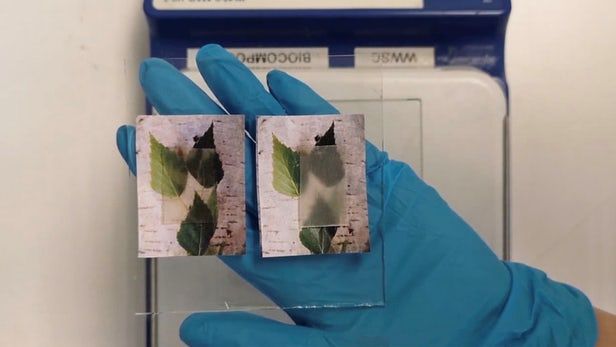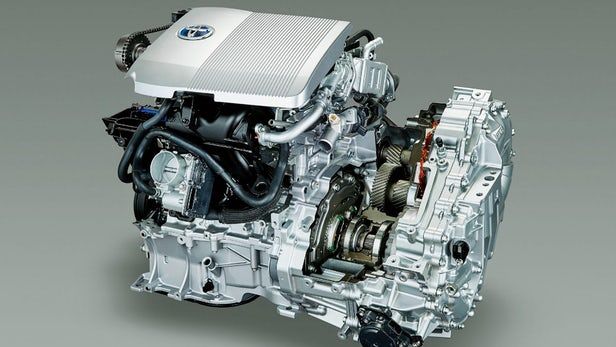A Black Hole of Global Warming Stupidity has been formed. Beware of the event horizon.
Meteorologist and founder of most-read climate website in the world named senior fellow.


Three years ago, we heard how scientists from Sweden’s KTH Royal Institute of Technology had created transparent wood – it could serve as a cheaper alternative to the silica-based glass currently used in windows and solar cells. Now, the material is additionally able to store heat and later release it.

Almost 5 years after Elon Musk allowed other manufacturers access to Tesla patents without fear of legal action – effectively making them open source – Toyota has announced that it’s opening up its vehicle electrification patent archive to help speed up the development and adoption of electric vehicles.

Plastic pollution is something everyone should not be aware of. In the news, a lot of focus has been on the plastic pollution created by the fashion and food industry, but sometimes it seems like the toy industry is getting a pass. If you think about it, the majority of children’s toys are made of plastic. According to Plastics, 90 per cent of all toys on the market are made of plastic, which is a ridiculous amount of plastic. So where do the discarded toys, that do not end up charity shops, end up? Plastic toys are becoming a substantial environmental problem, especially as quite a few can be found living in their new home, the rubbish dump.
Raising sustainability-conscious kids is not easy, so why are companies not making it easier for parents? Well, a few small startups have been leading the movement by embracing circular economy principles. They are focusing on locally making toys from recycled straw, sawdust and plastic milk bottles, but I do wonder whether their efforts to create a sustainable toy market will lead to large mass producers like Hasbro. I am optimistic and believe it is possible. My optimism strengthened when I heard that Danish toy company Lego has begun the production of a new line of sustainable Lego accessories made from plant-based polyethene derived from sugarcane ethanol, as opposed to the polyethene from oil.
“The investment announced is a testament to our continued ambition to leave a positive impact on the planet, which future generations will inherit.”
Tesla has released a video showing the first delivery of a vehicle to a customer using a Tesla Semi electric truck prototype – showing a glimpse of a future with zero-emission electric vehicle deliveries.
Over the last few quarters since Model 3 production has been somewhat sustainable at high volume, Tesla has had issues delivering the high numbers of vehicles.
At one point, it even started building its own car carriers and more recently, the company bought car-hauling trucks and trailers with $13 million in equity.

Human agency and oversight — AI should not trample on human autonomy. People should not be manipulated or coerced by AI systems, and humans should be able to intervene or oversee every decision that the software makes. — Technical robustness and safety — AI should be secure and accurate. It shouldn’t be easily compromised by external attacks (such as adversarial examples), and it should be reasonably reliable. — Privacy and data governance — Personal data collected by AI systems should be secure and private. It shouldn’t be accessible to just anyone, and it shouldn’t be easily stolen. — Transparency — Data and algorithms used to create an AI system should be accessible, and the decisions made by the software should be “understood and traced by human beings.” In other words, operators should be able to explain the decisions their AI systems make. — Diversity, non-discrimination, and fairness — Services provided by AI should be available to all, regardless of age, gender, race, or other characteristics. Similarly, systems should not be biased along these lines. — Environmental and societal well-being — AI systems should be sustainable (i.e., they should be ecologically responsible) and “enhance positive social change” — Accountability — AI systems should be auditable and covered by existing protections for corporate whistleblowers. Negative impacts of systems should be acknowledged and reported in advance.
AI technologies should be accountable, explainable, and unbiased, says EU.

A Dutchman completed an epic 95,000 kilometre (59,000 mile) journey by electric car in Sydney Sunday in a bid to prove the viability of such vehicles in tackling climate change.
Wiebe Wakker drove his retrofitted station wagon nicknamed “The Blue Bandit” across 33 countries in what he said was the world’s longest-ever journey by electric car.
The trip from the Netherlands to Australia took just over three years and was funded by public donations from around the world, including electricity to charge the Bandit, food and a place to sleep.
Andrew Yang gives a dynamite interview on automation, UBI, and economic solutions to transitioning to the future.
Andrew Yang, award winning entrepreneur, Democratic Presidential candidate, and author of “The War on Normal People,” joins Ben to discuss the Industrial Revolution, Universal Basic Income, climate change, circumcision, and much more.
Check out more of Ben’s content on:
YouTube: https://www.youtube.com/c/benshapiro
Twitter: @benshapiro
Instagram: @officialbenshapiro
Check Andrew Yang out on:
Twitter: @ANDREWYANG
Facebook: https://www.facebook.com/andrewyang2020/
Website: https://www.yang2020.com
5. Division of labor
Much like division of labor in human societies, parts of the thick-footed morel fungus cultivate the bacteria while other parts help store the carbon for future use. This source-sink system is similar to human agricultural systems, where we move food from the fields to be processed and sold at grocery stores.
These five characteristics were confirmed experimentally using cell counting and 13C isotopic labeling. Much like humans, fungi can use cultivation, harvesting, storage, dispersal, and division of labor to farm bacteria. Don’t fear, hallmarks of agriculture that we can still claim as unique to humans include artificial selection or development as well as cultural transmission of agricultural innovations.
